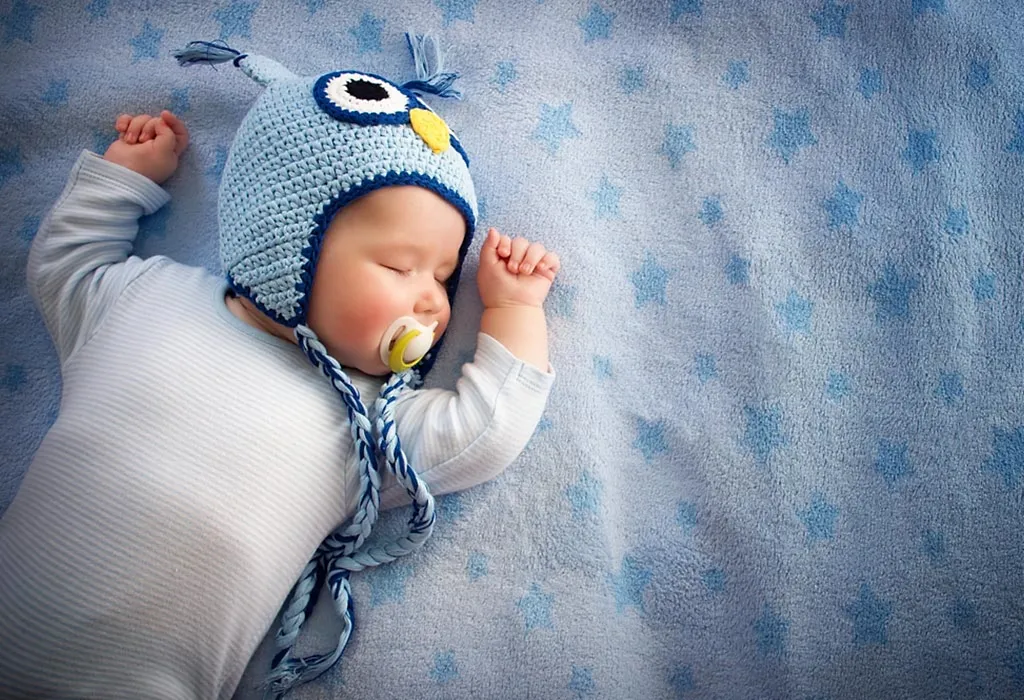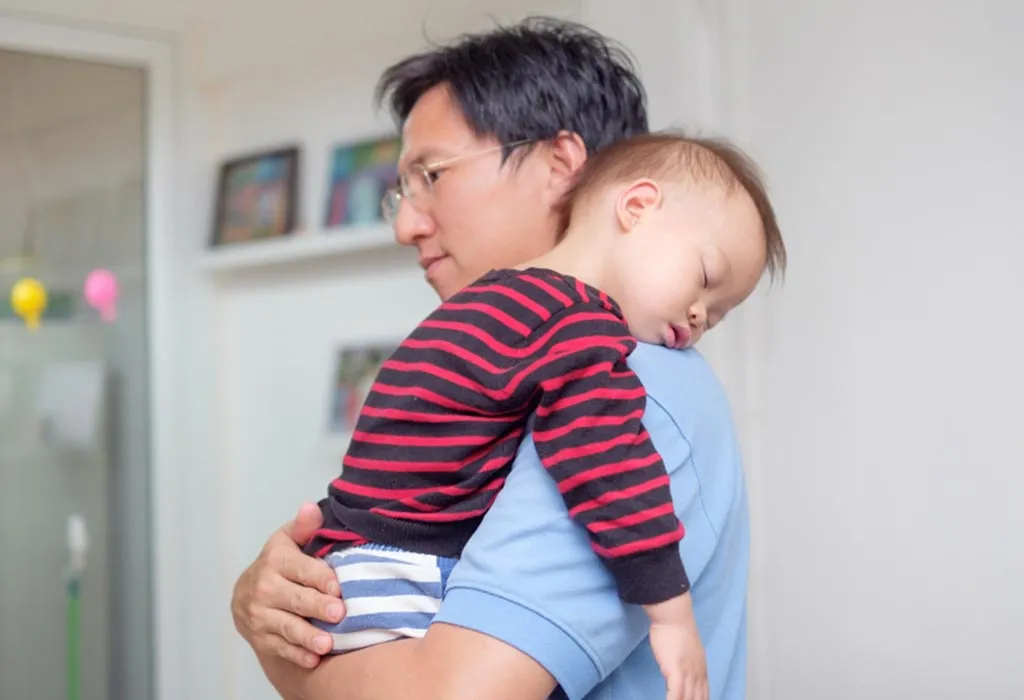Baby Sleep Regression – Signs, Causes & Tips to Deal With It

Did you know that your baby’s brain development can affect his behaviour? Sleep is one of the many bodily functions where this is most apparent. While newborn babies tend to drift into a deep slumber instantly, adults have a distinct sleeping pattern of going through light sleep and then deep sleep. This transition of sleep patterns does not exist in babies. However, just like their physical growth, you will find their brain development in full swing within months. Sadly, babies tend to become fussy and clingy during this time as it wreaks havoc on their sleeping patterns. Read on to learn about infant sleep regression.
What Is Sleep Regression?
The disturbance in sleep caused by the developmental changes in a baby is called sleep regressions. This occurs at different ages – when a baby is four months, eight months, eleven months, eighteen months, and at two years of age (1). 6-month sleep regression is also quite common in children. Not every child will go through a sleep regression during the months mentioned here, but it is common for babies to experience sleep regressions.
Causes of Sleep Regression in Babies
Sleep regressions can be challenging for both the baby and parents, often leading to frequent night wakings, shorter naps, and difficulty falling asleep. While sleep regressions are typically temporary, they are often linked to different factors (2).
- As babies grow, they reach new physical and cognitive milestones, such as rolling over, crawling, or babbling. These advancements can disrupt sleep as their brains and bodies adjust.
- The discomfort and pain associated with teething can make it harder for babies to settle and stay asleep.
- Travel, moving to a new environment, or alterations in daily schedules can disrupt a baby’s sleep patterns.
- Around 6-12 months, babies often develop separation anxiety, making it harder for them to sleep without their caregivers nearby.
- Increased appetite during growth spurts can cause babies to wake more frequently for feedings.
- Colds, ear infections, or other illnesses can interfere with a baby’s ability to sleep soundly.
- Too much activity or stimulation before bedtime can make it difficult for babies to wind down and fall asleep.
Signs of Sleep Regression in Babies
Sleep regressions are usually temporary and occur during periods of rapid growth or development. Recognizing the signs of newborn sleep regression can help parents better understand and address their baby’s needs during this time (3).
- A baby who previously slept through the night may start waking up multiple times, often struggling to fall back asleep.
- Naps may become shorter or more irregular, with the baby resisting sleep or waking up prematurely.
- Babies experiencing sleep regression may appear more cranky, clingy, or difficult to soothe during the day.
- Some babies may show increased hunger due to growth spurts, while others may eat less due to tiredness or discomfort.
When Do Babies Have Sleep Regressions?
Sleep regression months are common periods when babies experience temporary disruptions in their sleep patterns due to developmental changes. Here are some of the months where sleep regression happens and how to deal with it (4).
1. 4-Month Sleep Regression
The first time you will notice a change in your baby’s sleeping pattern is when he is around 4-months-old, but sleep regression happens even in babies who are 3 to 5-months-old.
What Happens in 4-Month Sleep Regression?
While your baby may have slept in longer stretches before, now you will notice that he wakes up frequently at night and takes shorter naps. During this time, he will be more prone to waking up about every two hours.
Why Does It Happen?
These changes in sleep are caused because of your baby’s developing brain. As his brain starts to develop, his sleep pattern undergoes changes, and it begins to become just like that of adults. He will start to experience the two stages of sleep, light and deep, which is probably going to be your baby’s first experience with sleep regression.
How to Deal With It
Here are some solutions for four-months-old baby’s sleep regression:
- Help him to fall asleep the way you normally do, but at certain scheduled times. Maybe you usually nurse your child to put him to sleep. Keep doing that for a while until he is used to the new routine. You can slowly wean him off this habit later.
- Try using a pacifier to soothe your baby while putting him to sleep. Swaddling is another helpful way to calm your baby down when it’s time for his naps or bedtime.
- Create a comfortable and safe environment for him. This will often mean you should be at home and not on the move. It is difficult for a baby to have a sound sleep if you are out and about.
- There is something known as a “dream feed,” which works for many parents, especially if the baby is less than six months. In this technique, you feed your child around his bedtime all without waking them up and then you carefully give him a nightcap during his sleep before you go to bed.
2. 8-Month Sleep Regression
Yet another time to be on the lookout for sleep changes in your baby’s usual routine. Some babies even experience sleep regression when they are 7-months-old.
What Happens in 8-Month Sleep Regression?
Cognitive development during this time can affect a baby’s sleep at this age. By this time, the baby will start refusing naps and will probably start trying to fight it. Most of the time, these regressions seem to take place during nap transitions.
Why Does This Happen?
Your baby will be going through many baby milestones and some physical changes. He will begin to crawl, cruise, and may even start his attempts at communication. Some babies also start teething at this age. All these changes are bound to affect your baby’s sleep. Nap transitions are another thing that may trigger sleep regression in babies. Usually, this is the age where the third nap of the day should be eliminated, especially if your baby is fighting it most of the time anyway. When a nap transition is not handled correctly, it could cause a regression.
An 8-months-old baby sleep regression could also be a result of your baby developing separation anxiety at this age, and he can become very clingy.
How to Deal With It
The best ways to deal with sleep regression in your 8-month-old are as follows:
- Stick to the regular sleep routine as changing anything may result in more problems. This period of regression is only a temporary one, after all.
- Allow your baby to have a lot of time during the day to practice all the new skills he has been learning, such as how to stand or cruise. This will help in reducing the chances of him trying to practice them in his crib.
- Make a couple of nap schedules, one which is a three nap schedule and the other a two nap schedule. You may have to alternate between the two, but try making sure to give your baby an early bedtime if you are following the two nap schedule.
- Make your baby’s sleeping area as dull as possible, so there is no stimulation to keep him awake. Make sure it is cosy, safe, and dark.
3. 11-Month Sleep Regression
This is somewhat rare, as many babies seem to skip this regression stage altogether.
What Happens in 11-Month Sleep Regression?
Your baby may start trying to refuse his second nap and try to make do with only one nap. This should not be encouraged as babies need two naps at least until the age of 15 months.
Why Does It Happen?
This particular sleep regression most often happens when parents try to transition their baby to one nap before he is ready. Although most babies these days do end up transitioning at this age and are fine, some do not, and in those cases, sleep regression will occur.
How to Deal With It
This may seem obvious, but keeping your baby on a two nap schedule is very important in dealing with the sleep regression at this age. While it may seem that your baby is naturally leaning towards a one nap cycle, you must keep in mind that very soon, he is going to start walking and trying other things, which will drain him of a lot of energy. This is why maintaining a two nap schedule will be a lifesaver and could prevent more sleep regressions in the future.
4. 18-Month Sleep Regression
Sleep regression taking place when a baby is 18-months-old is said to be the worst of all sleep regressions.
What Happens in 18-Month Sleep Regression?
One moment your baby is sleeping just fine, and all of a sudden, he isn’t. Toddler sleep regression is a time for more bedtime drama, more erratic naps, and constantly waking up at night. Around this time, the level of crankiness in babies only rises, he will want to be cuddled more often, and you will also notice a change in your baby’s appetite.
Why Does It Happen?
At this age, your baby is learning to be a bit more independent. And while this is something that will involve him learning how to feed himself with a spoon or put on his pants, he will also start defying you. This defiance can most often be seen even during bedtime, as he will want to either resist going to sleep or may decide to cry out for you and not go back to sleep until you soothe him. Teething is still taking place at this age, and this is when the canine teeth and the first molar tooth start appearing. It causes discomfort, and he can become restless. Babies at this age also experience separation anxiety. He may lie awake at night and eventually become upset if you are not there or may even resist sleep simply because he does not want to be away from you.
How to Deal With It
Here are a few things that you can try to help you and your baby get through this challenging phase:
- Make sure to establish a steady bedtime routine that has a consistent and proper end. For example, spend some quality time with your baby before bedtime as this will comfort him. You can end your bedtime routine with a night prayer every single night that your baby will soon learn is a signal for when it is time to sleep.
- Try introducing your toddler to a comfort item such as a teddy bear or a blanket of his choice. When children have something cosy and comfortable with them when they are in bed, they may not want to call out to you often.
- Offer a bedtime homemade snack rich in protein to ward off those late-night hunger pangs. This also turns out to be very useful for cases when growth spurts and sleep regressions coincide. Make sure to brush the baby’s teeth before sleeping.
- Your baby may not be able to understand if you try to complicate things, but telling your baby firmly why he needs to go to sleep in the simplest way possible will help a great deal in avoiding all the bedtime drama.
- Some children begin to develop nighttime fears at this age, so putting a nightlight in your baby’s room may help to soothe him as he falls asleep.
- Your toddler may not get over his sleep regression for a couple of weeks. Sometimes things take a little longer. In cases like this, you need to prepare yourself to retrain your baby on bedtime.
- Remain consistent with your rules of what you will and will not allow. For example, if your child is not allowed in your bed, do not make an exception just because he is going through a sleep regression. Another thing you need to be firm about is how soon you will go to see your baby if he wakes up calling for you in the middle of the night. Waiting is usually encouraged to help babies learn to put themselves back to sleep. So, if you have given yourself a time of five minutes before going in to check on him, remain consistent and do not go in sooner than that.
5. 2-Year Sleep Regression
This may be the toughest one to handle. However, rest assured this is the last and final of the sleep regressions your child is most likely to go through.
What Happens in 2-Year Sleep Regression?
As in the cases of all the other regressions, your baby will put up a struggle during nap time or bedtime, sometimes staying up for an entire hour laughing and playing, or in worse cases, he will scream for most of it. Sometimes he may settle down but then will start up a fuss when you leave him alone.
Why Does It Happen?
At this age, children will go through separation anxiety, and sometimes, they may not want to miss out on the fun they think you are going to have without them. At two years of age, your baby will be going through a few notable life changes. Most children are potty trained at this age, and some may even be going from sleeping in a crib to sleeping on a kid’s bed. Some children will also have to deal with welcoming a new sibling at this time, something that disturbs most children as they feel they will not get much attention.At this stage, you will notice your baby will start becoming self-aware, and this will cause him to resist taking naps. Your baby will also develop a vivid imagination, and while this is great in play, it can cause him to develop irrational fears at night as he will now be aware that there are bad things out there in the world that could hurt him.
How to Deal With It
Here are some ways to help your 2-year-old through her regression:
- If your toddler seems to be developing sleep regression due to any lifestyle changes, such as potty training or shifting beds, stop and wait for a few months until you feel your baby is truly ready to deal with the lifestyle changes.
- Sometimes you may need to change your baby’s nap schedule to allow for more awake time. You can do this by either scheduling his afternoon nap earlier or by pushing bedtime a little later than usual.
- If your baby is resisting his naps, then make sure to give him “rest time” where you put him in his crib with some books and some toys. He needs to know that he can stay awake but that he needs to stay in bed. This is also beneficial for you because if he does end up feeling sleepy, he is already well-positioned for a nice nap.
- If he experiences night terrors, the best thing you can do for him is to stay calm and not overreact as he will take most of her cues from you. Be gentle as you help your child back to sleep, but never encourage bad habits such as allowing your child into your bed or getting into bed with him.
This was all about baby sleep regression ages.
How Long Does Baby Sleep Regression Last?
Baby sleep regression typically lasts between 2 to 6 weeks, though the duration can vary depending on the cause and the baby’s individual temperament (5). Most sleep regressions are temporary and resolve on their own as the baby adjusts to new developmental milestones, changes in routine, or other factors. Consistency in sleep routines and a calming environment can help shorten the duration and ease the transition for both the baby and the parents.
Some Common Baby Sleep Regression Management Tips
Sleep regression can be a challenging phase for both babies and parents, but with the right strategies, it can be managed effectively. Here are some practical tips on how to manage sleep regression in babies (6):
1. Stick to a Consistent Sleep Routine
Maintain a predictable bedtime routine, such as a warm bath, feeding, and reading a story, to signal to your baby that it’s time to sleep. Consistency helps create a sense of security.
2. Offer Comfort and Reassurance
During sleep regression, babies may need extra comfort. Respond to their needs with gentle soothing, such as rocking, patting, or singing, to help them feel safe and secure.
3. Adjust Nap Schedules
Ensure your baby is getting adequate daytime sleep, as overtiredness can worsen nighttime sleep disruptions. Adjust nap times if needed to align with their changing sleep needs.
4. Create a Calm Sleep Environment
Make sure the sleep space is quiet, dark, and comfortable. Use white noise machines or blackout curtains to minimize distractions and promote better sleep.
5. Be Patient During Night Wakings
If your baby wakes up at night, try to soothe them back to sleep without immediately resorting to feeding or picking them up. This can help them learn to self-soothe over time.
6. Monitor Developmental Changes
Sleep regressions often coincide with developmental milestones. Encourage your baby’s new skills, like crawling or standing, during the day to reduce their urge to practice at night.
Can You Prevent Sleep Regression in Babies?
No, you cannot entirely prevent sleep regression in babies, as it is a natural part of their development and often linked to growth milestones. However, you can minimize its impact by maintaining consistent routines, creating a sleep-friendly environment, and being responsive to your baby’s needs.
When to Call the Doctor
Sleep regression in babies is typically a normal phase tied to development, but there are certain situations where consulting a doctor may be necessary. Here’s when to consider reaching out to a healthcare professional:
- If the sleep regression lasts longer than 6 weeks and significantly disrupts your baby’s sleep patterns despite trying various strategies.
- If your baby shows symptoms like fever, coughing, ear pain, or difficulty breathing, it could indicate an underlying illness affecting their sleep.
- If your baby is excessively cranky, inconsolable, or shows signs of discomfort that don’t improve with soothing.
- If your baby refuses to eat, shows a significant decrease in appetite, or isn’t gaining weight appropriately.
- If you notice delays in reaching milestones or other developmental issues alongside sleep problems.
FAQs
1. Does sleep regression affect breastfed and formula-fed babies differently?
While sleep regression can affect both breastfed and formula-fed babies, breastfed babies may wake more frequently during regressions due to the digestibility of breast milk and the need for more frequent feedings. However, the underlying causes of regression (e.g., developmental milestones) are the same for both.
2. Can a baby’s sleep regression impact sibling sleep patterns?
Yes, if a baby’s frequent night wakings or crying disrupt the household, older siblings may also experience sleep disturbances. This can create a ripple effect, making it important to address the baby’s regression while ensuring the rest of the family gets adequate rest.
3. Is there a link between sleep regression and baby’s emerging personality traits?
Some parents notice that sleep regressions coincide with their baby showing new personality traits, such as increased curiosity, assertiveness, or independence. These emerging traits can contribute to sleep disruptions as the baby becomes more aware of their surroundings and desires.
Always remember that these sleep regressions that your baby will go through are not permanent, except for the sleep regression during the fourth month. If you have weaned your baby off of some sleep associations, do not go back to those habits to comfort your child. You can soothe your baby by doing other things that will help to comfort him.
References/Resources:
1. Cleveland Clinic – Infant Sleep Regression: What Parents Need To Know
2. Penn Medicine Lancaster General Health – Understanding and Navigating Sleep Regressions
3. UPMC Health Beat – Sleep Regression in Babies: When and Why It Happens
4. Pathways.org. – Is Baby Going Through Sleep Regression? What It Is and How To Help
5. SleepFoundation.org. – 4-Month Sleep Regression
6. Breastfeeding Support for Indian Mothers – Sleep Regression
Also Read:
Baby Sleeping Position
Tips to Make Baby Sleep at Night
10 to 12 Month Old Baby Basic Sleep
Was This Article Helpful?
Parenting is a huge responsibility, for you as a caregiver, but also for us as a parenting content platform. We understand that and take our responsibility of creating credible content seriously. FirstCry Parenting articles are written and published only after extensive research using factually sound references to deliver quality content that is accurate, validated by experts, and completely reliable. To understand how we go about creating content that is credible, read our editorial policy here.



























.svg)


















